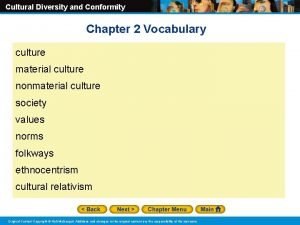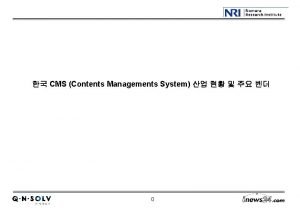Contents 1 Cultural Diversity Cultural Diversity Cultural Diversity










































- Slides: 42

Contents 1 Cultural Diversity 이문화 - Cultural Diversity -

Cultural Diversity

Working Across Cultures • Working with people from other cultures brings both massive challenges and massive rewards. You will find below some of the key issues to bear in mind when working in a culturally diverse environment. Above all remember to keep an open mind at all times! Cultural programming: • • • Your place of birth and childhood influences can have a major impact on your approach to work and business later in life We are all ‘programmed’ to behave in a certain way and to respond to issues differently Very few people are ever able to shake off this early programming and it is vital that you acknowledge and recognize that you have a certain ‘cultural style’ which may seem alien to other nationalities It is as important that you understand your own cultural approach as it is to understand the approach of others

Self-promotion and self-deprecation • Certain cultures find it difficult to speak positively about themselves and prefer to understate their abilities and self-deprecate about themselves in general. • Other cultures, however, are much more self-promotional and would find it bizarre to say they were not very good at something when in fact they were skilled in that area. These cultures will only say they are not good at something if they genuinely have a problem in that area. • People from cultures which prefer understatement often find colleagues and clients from more selfpromotional cultures to be aggressive and arrogant whereas people from the more self-promotional cultures will often take on face value the understatement of other cultures – they believe them if they say they have a weakness! • Self-deprecating cultures include: Japan, China, Korea, UK, Finland • Self-promotional cultures include: USA, Australia, France, Brazil

Written and spoken word • Some cultures place far greater emphasis on the importance of written communication between people. Only when something has been communicated in writing does that issue become a reality • Other cultures place much greater emphasis on the value of spoken communication – things are only really believed when they have been communicated by people with whom they have a strong, trusting relationship. • This simple fact can have a major impact on communication flow and the achievement of objectives within an international team. Do you communicate to each team member in exactly the same format regardless of their cultural background? Might it be a good idea to communicate more information orally to certain people if you want them to fully ‘buy-in’ to what you want to achieve? • Written-word cultures include: Germany, UK, USA, Sweden, Netherlands • Spoken-word cultures include: Spain, Italy, Saudi Arabia, India, Brazil

10 Golden Rules 1. Avoid making instant judgments or assumptions about people from different cultures regarding their working style 2. Try to do some research on any culture you will be working with 3. Try to understand how your leadership style might be viewed through the eyes of team members from different cultures – they may view your style as bizarre 4. Remember that not all problems encountered in international situations are the result of cultural differences – the issues could be personality-based, technical or commercial 5. Just because people do things differently in another country does not mean that they are necessarily wrong in their approach – they might be wrong but they are not necessarily wrong. It is as important that you understand your own cultural approach as it is to understand the approach of others. 6. A good idea is a good idea regardless of where it originates – you do not have all the answers 7. Not all ideas from head office are good ideas 8. Not all ideas from head office are bad ideas 9. When communicating with people who are speaking a second language, do not over-estimate their linguistic abilities. Just because they are good at a second language does not mean they are perfect! 10. Teams and organizations that are at ease with themselves and co-operate well across the cultures will prosper in an increasingly global economy.

Background To Business: North Africa • A large number of international organizations and business people have been wary of doing business in Africa for many years. Africa as well as being one of the most oil-rich places in the world. Couple this with the fact that many country’s are abundant in many other natural resources and has good port facilities and you might think that international business would be fighting for a piece of the action in many countries. • The fact that Africa is not a magnet for international investment could be seen as a tragedy of immense proportions. Years of political instability, regional strife and the weakening influence of massive corruption have resulted in many country’s failing to capitalize on their many advantages; leaving the mass of the population in relative poverty and most country’s enormously infra-structure poor. • Huge strides have been made in the last few years to try to tackle the many endemic problems which assail these country’s — with political and economic stability being seen as the key weapons in attacking the corrosive influence of corruption. Whether the actions being taken on the ground now lead to dramatic improvements in levels of transparency and levels of corporate governance remain to be seen.

Top Tips on Business Culture: North Africa • • • Tip 1 It is important to research any company before approaching it in order to determine whether it is state-owned or private and secular or Islamic in orientation. Tip 2 When doing business with an Islamic oriented organization, do not overlook the potential impact of religious issues on any decision- making process. Tip 3 Business is driven by relationships and therefore a great deal of resource and time should be allocated to the development of key contacts. Tip 4 Who you are and who you know are important issues; therefore it can be difficult to break into business without access to the right initial contacts. Tip 5 In order to help develop the all-important initial contacts it is often necessary to appoint a gobetween who can arrange meetings and act as a bridge into the culture. Tip 6 It may be necessary to appoint a number of different go-betweens who know the locality. Tip 7 Companies tend to be hierarchical and power usually rests in the hands of a small number of key senior managers who make all the major decisions. Tip 8 Managers tend to give direct instructions and subordinates are not expected to show initiative. If something is not specifically requested, it may not get done. Tip 9 Meetings can involve sitting in rooms with unknown people who are simultaneously meeting your contact. In effect, several meetings may take place at the same time. Tip 10 Initial meetings can be very time-consuming and appear to deliver very little in terms of tangible returns.

Background To Business: Russia • CIS country’s, including Russia, are a fragmented society, undergoing a radical period of change and readjustment. The old order has been swept away, leaving a political and economic void. It is, therefore, true to say that things in the CIS change on a day-to-day basis and that, in such disparate country’s, what is true for one region might be untrue in the next. • Certain universal truths do, however, typify the approach to business and life in general. Firstly, it is always worth bearing in mind that for centuries (long before the advent of the Soviet system), the state has always been seen as an organ of oppression and repression. Laws and statutes are therefore seen as the 'enemy' and to be avoided and evaded at all costs. Contracts are valid only if supported by a close personal friendship and taxes are left unpaid on both a corporate and personal level. • Secondly, the only things that can be relied upon are close personal relationships within the business environment. Networking and extended interpersonal allegiances are essential to successful business and the importance of resource allocation to ensure the development of good quality relationships should not be underestimated. • Thirdly, the legal status of many companies is very dubious, being incorporated under the old laws of the Soviet Union which no longer have validity. Who actually owns the assets of an organization? The laws are being rewritten constantly and are, in any case, virtually unenforceable. Thus, most agreements have to be made on a trust basis - a strong element of which has to be clearly identifiable self-interest. The legal basis of any arrangement will probably mean very little once the relationship breaks down.

Top Tips on Business Culture: Russia • • • Tip 1 With the country in a state of total flux, attitudes to business can vary widely from sector to sector and from region to region. Are you dealing with a new-style entrepreneur or an old-school Soviet bureaucrat? Tip 2 Law-breaking and rule avoidance have been promoted to an art-form in a country where the state has, for centuries, been seen as the enemy. Tip 3 In a country where the rule of law has all but broken down, the only thing that can be relied upon in a business context is the strength of the relationships upon which the business is based. Do not underestimate the importance of relationship building - or the time taken in the process. Tip 4 Contracts are only as valid as a combination of your ability to enforce the law and the importance placed upon the relationship. Trying to enforce an unpopular clause in a contract could prove virtually impossible. Tip 5 Companies are often driven and directed by one strong, central character. Without the approval of this individual, very few decisions will be taken and any that are would probably prove invalid. Tip 6 Don't waste time trying to get decisions out of middle and junior managers - go straight to the top if possible. Tip 7 Companies tend to take a short-term view of any given business opportunity. In a country’s that are volatile and uncertain who knows what lies around the corner? Tip 8 Managers are expected to manage and this means giving precise and detailed instructions to subordinates. Inclusive, 'caring' management styles might be viewed as weak. Tip 9 Meetings tend to be used to disseminate information or to give direct instruction - do not expect a great deal of open debate or disagreements in front of senior managers. Tip 10 Smaller, more informal meetings often occur behind closed doors where senior management might canvas opinion or seek other opinions.

Background To Business: Middle East • • Western business culture makes a strong separation between work and religious belief. Even very devout Christians would be loath to invoke divine scriptures or mention the will of God in a typical business encounter. However, when doing business in the Middle East, it is important to bear in mind the all-pervasive nature of the influence of Islam. Life and business as an important aspect of life, are governed by the prescriptive tenets of a religion which forms the backdrop to society. Nothing happens which has not been willed by God. If a deal comes off it is due to the will of God, if it fails it was not meant to be. Thus, a sense of fatalism and a resulting lack of urgency are often quoted by business people from non-Islamic cultures as being the over-riding impressions of a trip to Saudi. • The oft-quoted Arabic phrase, In Sha Allah, (if God wills it) represents a deeply rooted belief in the unending activity of a Supreme Being, rather than an excuse for inactivity or lack of motivation. • The observance of religious ritual takes precedence over all other aspects of life and prayer punctuates the business day. Meetings' discourse contains numerous references to God and His Prophet Mohammed and offices display numerous Koranic texts.

Top Tips on Business Culture: Middle East • • • Tip 1 All aspects of life in the Middle East are governed by an absolute belief in the teachings of Islam and an adherence to its tenets. No business deal will ever be discussed without reference to the Almighty and His Prophet Mohammed. Tip 2 It goes without saying that the utmost respect must be given to such devoutly held religious beliefs and accommodations made to allow people to observe religious rituals of prayer and fasting. Tip 3 As all things emanate from the will of Allah, a degree of fatalism and acceptance are inherent in the Middle Eastern character. Things will or will not happen according to the will of God and not because of the actions of man. The meeting will take place tomorrow at nine o'clock - God willing. Tip 4 Business is usually family-based with all senior positions filled by family members. Nepotism is the natural order of things and not something that needs to be explained to visitors. Tip 5 This family-orientation leads naturally to the development of strong hierarchies with the oldest male relatives being at the head of the organization. Tip 6 Age is worthy of respect and honorable visitors will display respect to older people - therefore it is good to have some older heads amongst any delegation going to the Middle East. Tip 7 Try to find out the relationship tree of any company you wish to do business with. Power may not reside with a functional head if that head is not a family member or has poor relationships at the top. Tip 8 Managers tend to lead through instruction and subordinates are not expected to show initiative. If is not requested, it may not get done. Tip 9 Meetings can involve sitting in rooms with unknown people who are simultaneously meeting your contact. In effect, several meetings may take place at the same time. Tip 10 Initial meetings can be very time-consuming and appear to deliver very little in terms of tangible returns.

Background To Business in China • At the beginning of the 21 st century, the People's Republic of China finds itself in the midst of social, economic and cultural transition (some might even say turmoil). The old certainties, which epitomized the iron-tight grip of the Communist Party during the reign of Mao Zedong, have been replaced by the more liberal but unclear policies instituted by Mao's great reforming successor, Deng Xiaoping and continued by the present regime. • The pursuit of profit is no longer 'counter-revolutionary' and business people have long since ceased being viewed as enemies of the people. Yet the Communist Party is still in power and shows little appetite for any of the political reform so much clamored for by the West. Deng himself best described this seemingly paradoxical situation (rampant capitalism in the midst of a communist country) in two oft-quoted maxims: • 'It doesn't matter whether a cat is black or white so long as it catches mice. ' and 'To get rich is glorious. '

Top Tips on Chinese Business Culture • • • Tip 1 Guanxi, or personal relationships are of vital importance when doing business in China. Do not underestimate the importance of the relationship building process. Tip 2 People are comfortable building relationships with honorable people who show respect to those to whom respect is due. Tip 3 As all relationships are unequal it is important, if you wish to appear honorable, to show respect to age, seniority and educational background. Tip 4 Managers tend to be directive, which reflects basic Confucian concepts of the hierarchical nature of society. Tip 5 In return for loyalty, the boss is expected to show consideration and interest in all aspects of a subordinates' life. Tip 6 There are often close relationships between senior management of a company and local party officials. Tip 7 It is important that you do not make people 'lose face' in front of their group. Always respect seniority and do not openly disagree with people. Tip 8 Do as many favors for people as possible - debts must always be repaid. Tip 9 Business cards should be formally exchanged at the beginning of meetings. Treat the business card with great respect, as the card is the man. Tip 10 Meetings are often long and seemingly without clear objectives. Very often the meeting is an exercise in relationship-building and the aim of the meeting is to move the relationship, rather than any specific business task, forward.

Background To Business in The USA • More than any other industrialized country, the United States has adopted what could be labeled a 'scientific' approach to business. Every aspect of commercial life is studied analyzed and this scientific approach is both respected and acted upon. Far more resource is available in the US for the study of the methodology of business than in any other country and most new management theory and doctrines have their origins in the States. • In the States everything is quantified and assessed. All processes, even down to such issues as HR and Training are analyzed in a detailed manner and the results of this analysis carry weight with decision makers. • This 'scientific' approach - the constant search for better, more effective methods - has led to a business environment typified by the presence of change as a constant factor. The most common response to a changing environment is realignment of the organization and this, in turn, has produced a work force in a state of constant flux. People leave, are fired or made redundant and then reappear in another organization. This sense of employee mobility should not, however, be equated with a lack of loyalty to the employer for whom you are currently working. Whilst working for the company you put everything into the job and are totally committed.

Top Tips on USA Business Culture • Tip 1 Americans value straight talking and 'getting to the point'. • Tip 2 Respect is earned through conspicuous achievement rather than through age or background. • Tip 3 Self-deprecation is often misunderstood by Americans as a sign of weakness. Sell your plus points. • Tip 4 Humor is frequently used in business situations but is unlikely to be appreciated when matters become very tense. • Tip 5 Remember that time is money in the States - wasting people's time through vagueness is lack of a sense of purpose which will not produce good results. • Tip 6 Compromise is often sought - at the brink. This can often equate to the end of a quarter or financial year. • Tip 7 Do not be offended by seemingly overly personal questions. • Tip 8 Dress code in the States is very variable - check on the appropriate mode before departure. • Tip 9 Short-termism is endemic. Structure proposals to emphasize quick wins rather than long-term objectives (although these should also be included. ) • Tip 10 You may encounter an 'American is best' view to doing things - be prepared to counter this with quantitative and qualitative counter- arguments.

Background To Business in Brazil • Brazil could be said to offer very real business opportunities to prospective international investors but those people attempting to do business in the country should be aware of the significant cultural challenges which await them. • With a population of 178 million, Brazil represents the fifth largest market opportunity in the world — after China, India, Indonesia and the USA. It is also the fifth largest country in the world by geographic size. Recent IMF (International Monetary Fund) reports indicate that Brazil leads all other South American countries in terms of infrastructure and technological development. Combine these facts with a stabilizing economic and political landscape — (the twin nightmares of corruption and hyper-inflation ravaged the country for decades) — and it is easy to see why Brazil attracted 3% of total global foreign direct investment last year. • However, anybody wishing to do business with Brazil and the Brazilians should be aware of the various cultural and structural barriers which might confront them. Probably the most pervasive barrier encountered by the unwary traveler would be the Custo Basilâ or the Brazil Costâ. This term refers to the very real extra costs of doing business in Brazil — corruption, governmental inefficiency, legal and bureaucratic complications, excessive taxation, poor infrastructure, inflation etc. Although this costâ is difficult to define, it is real and the cause of great frustration for international business people.

Top Tips on Brazil Business Culture • • • Tip 1 Brazil offers a wealth of opportunities to prospective investors but is also a country beset with bureaucratic and cultural difficulties - it is imperative to do your homework in advance. Tip 2 Due to the various cultural and administrative complexities of the country, local advice and expertise is imperative in the early stages of business development. Tip 3 Companies tend to be organized along strictly hierarchical lines (although this may vary if dealing with the subsidiary of a multi-national). Tip 4 If possible, make sure you are dealing with the decision-maker rather than an influencer of the decision-maker. Tip 5 Managers are expected to manage - don't be afraid to give clear, precise instructions. Tip 6 Organizational hierarchy can be complicated by an intricate web of political alliances and relationships. Who is the real decision maker? Tip 7 Relationships come first, second and third in Brazil. Time spent working on the development of longterm friendly relations is never a waste of resource. Tip 8 It is always a good idea to stress long-term commitment to Brazil and your Brazilian contacts. Try to keep in touch between contracts or projects. Your relationship with your Brazilian counterparts is not purely transactional. It is personal as well. Tip 9 Although first meetings can be more formal. They are generally quite informal and relaxed. Tip 10 Punctuality is a variable commodity in Brazil. Meetings often start and finish late. It can be difficult to schedule more than one or two meetings per day.

Background To Business in India • As a country, India covers a land area greater than that of Europe. Its inhabitants speak a bewildering array of languages (16 official languages as well as innumerable local dialects and patois) The people live in twenty-eight states and seven union territories. It is hardly surprising, therefore, that India is a country about which it is very difficult to make sweeping generalizations. • Yet, India presents a massive market opportunity for companies who wish to expand their markets internationally. With a population in excess of one billion - many millions of whom are reasonably affluent and possess large disposable incomes, the sub-continent is widely tipped as one of the twentyfirst century's potential success stories. Those business organizations that wish to profit from India's rise, would do well to spend a little time studying the cultural norms which drive thinking of the Indian people. • Although it is difficult to generalize about approach to business in India, there are certain factors which would seem to be almost universal in their applicability and which need to be borne in mind when working with Indian contacts. These issues include the fact that India is a country in which relationships are placed before business and thus the relationship phase of the business cycle could be considered to be the most important. • In addition, the legacy of the caste system ensures that businesses are extremely hierarchically structured and that the boss is very definitely the boss.

Top Tips on Indian Business Culture • • • Tip 1 India is one of the most diverse countries in the world and therefore all generalizations about Indian culture should be treated with caution. Try to research each client thoroughly before entering into any negotiations. Is it a traditional, family-run business or a more modern hi-tech operation working with western business methodology? Tip 2 India, more than most other countries, places great value on the quality of inter-personal relationships. Do not try to push things along too quickly in the early stages - take the time to develop relationships. Tip 3 Both society and business are extremely hierarchically arranged and many Indians find it extremely difficult to work in a non-hierarchical structure. Tip 4 Trying to introduce a flatter, more egalitarian approach into a society in which the caste system still flourishes can prove extremely difficult and painful for all concerned. Tip 5 Most decisions are made at the top of an organization and it can, therefore, be a waste of time and resource to spend too much time negotiating at the middle levels of a company if top level approval has not already been given. Tip 6 The boss is definitely the boss in India and is expected to 'play the part. ' Senior managers are not expected to engage in work which could be undertaken by somebody lower down the organization. Tip 7 Managers are expected to give direct and specific instructions to subordinates - and subordinates are expected to carry out the instructions unquestioningly. Tip 8 Do not expect too much initiative from subordinates, contractors etc. Plan in great detail and explain exactly what needs to be done. Tip 9 Meetings can seem very informal and it is possible for several meetings to be conducted by one person at the same time and in the same room. Try not to become irritated by this informal approach. Tip 10 Time is fairly fluid. Be prepared for meetings to start and finish late and for interruptions to occur on a regular basis.




Summary: United Kingdom of Great Britain and Northern Ireland Capital London Languages Official: English Regional: Cornish, Irish, Scots, Welsh, Scottish Gaelic, Ulster-Scots Ethnic Groups 87. 1% White 7. 0% Asian 3. 0% Black 2. 0% Mixed 0. 9% Other Demonym British - Briton Government Unitary parliamentary constitutional monarchy (입헌군주정체) Monarch - 1707 – 1714 Anne - 1714 – 1727 George I - 1727 – 1760 George II - 1760 – 1800 George III - Present Elizabeth II - Prime Minister David Cameron Legislature Parliament - Upper house House of Lords - Lower house House of Commons Formation - Acts of Union 1707 1 May 1707 - Acts of Union 1800 1 January 1801 - Anglo-Irish Treaty 6 December 1922 Area 243, 610 km 2 (94, 060 sq mi) – 80 th in the world Population 64, 100, 000 (2013 estimate) – 22 nd in the world

Summary: United Kingdom of Great Britain and Northern Ireland GDP (PPP) 2014 estimate - Total: $2, 435 trillion – 10 th in the world - Per capita: $37, 744 – 27 th in the world GDP (nominal) 2014 estimate - Total: $2, 848 trillion – 6 th in the world - Per capita: $44, 141 – 22 nd in the world Currency Pound sterling (GBP) Time zone GMT (UTC) - Summer(DST) BST (UTC+1) Calling code +44 Internet TLD . uk Drives on the left

















Summary: State of Israel Capital Jerusalem Languages Official: Hebrew & Arabic Religion Judaism Demonym Israeli Government Unitary parliamentary republic - President Reuven Rivilin - Prime Minister Benjamin Netanyahu Legislature Parliament - Upper house House of Lords - Lower house House of Commons Formation - Acts of Union 1707 1 May 1707 - Acts of Union 1800 1 January 1801 - Anglo-Irish Treaty 6 December 1922 Area 243, 610 km 2 (94, 060 sq mi) – 80 th in the world Population 64, 100, 000 (2013 estimate) – 22 nd in the world
 Genetic diversity vs species diversity
Genetic diversity vs species diversity Genetic diversity vs species diversity
Genetic diversity vs species diversity Socio-cultural diversity
Socio-cultural diversity Positive and negative effects of cultural diversity
Positive and negative effects of cultural diversity Cultural diversity and conformity section 1
Cultural diversity and conformity section 1 Cultural diversity and conformity section 1
Cultural diversity and conformity section 1 2009 delmar cengage learning
2009 delmar cengage learning Melting pot vs salad bowl
Melting pot vs salad bowl Cultural diversity 3939 answers
Cultural diversity 3939 answers Whole school approach to cultural diversity
Whole school approach to cultural diversity Four skills of cultural diversity competence
Four skills of cultural diversity competence Chapter 9 cultural diversity
Chapter 9 cultural diversity Chapter 13 cultural diversity and community health nursing
Chapter 13 cultural diversity and community health nursing East africa has great cultural diversity because of its -
East africa has great cultural diversity because of its - Cultural diversity tcole
Cultural diversity tcole Cultural diversity and conformity section 1
Cultural diversity and conformity section 1 Cultural diversity a primer for the human services
Cultural diversity a primer for the human services Cultural diversity and conformity section 2
Cultural diversity and conformity section 2 Cultural diversity hands
Cultural diversity hands Chapter 4 communication and cultural diversity
Chapter 4 communication and cultural diversity Cultural diversity means a range of different
Cultural diversity means a range of different Zone of comfort phlebotomy
Zone of comfort phlebotomy Cultural diversity 3939 answers
Cultural diversity 3939 answers Cultural diversity and conformity section 2 answers
Cultural diversity and conformity section 2 answers Cultural diversity and conformity chapter test form a
Cultural diversity and conformity chapter test form a Culture trait
Culture trait Cultural diversity examples
Cultural diversity examples Cultural diversity pros and cons
Cultural diversity pros and cons Table of contents slide
Table of contents slide Anterior
Anterior Clovis unified school district preschool
Clovis unified school district preschool Superior mediastinum
Superior mediastinum Ascending pharyngeal artery
Ascending pharyngeal artery Ocr epq examples
Ocr epq examples Serratus anterior nerve
Serratus anterior nerve Zetoc
Zetoc Interactive notebook table of contents
Interactive notebook table of contents What is vo
What is vo Contents of a dead man's pocket conflict
Contents of a dead man's pocket conflict External conflict in contents of the dead man's pocket
External conflict in contents of the dead man's pocket Spermatic cord layers
Spermatic cord layers Company profile table of contents
Company profile table of contents Table of contents error
Table of contents error































































